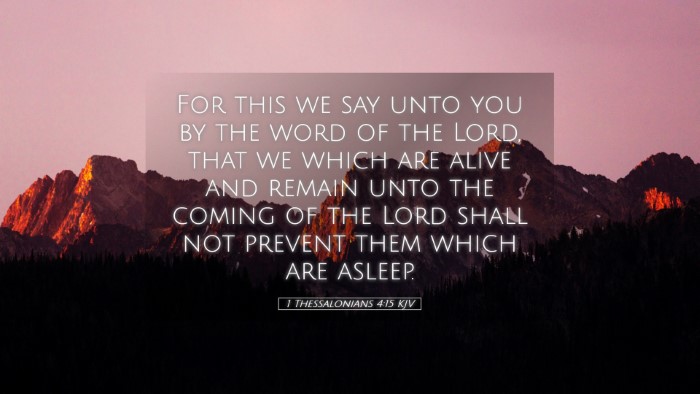Commentary on 1 Thessalonians 4:15
Verse Text: "For this we say unto you by the word of the Lord, that we which are alive and remain unto the coming of the Lord shall not prevent them which are asleep."
Introduction
This profound verse is a cornerstone in the Pauline epistles, highlighting the hope of resurrection and the Second Coming of Christ. The Apostle Paul provides reassurance to believers in Thessalonica regarding those who have died in faith. Paul assures the living members of the church that they will not have an advantage over those who have passed away before the return of Christ. This commentary draws insights from various public domain sources to provide a deeper understanding of this significant passage.
Contextual Background
Paul’s first letter to the Thessalonians was written to address various issues, including the Second Coming of Christ and the fate of deceased believers. The Thessalonian church was troubled by the deaths of fellow believers and their fear that those who had died would miss out on the glory of Christ’s return. In addressing these concerns, Paul provides both a theological framework and practical comfort.
Exegesis of the Verse
Word of the Lord: Paul begins by affirming that the message he conveys is not merely his own thoughts but the result of divine revelation. This lends authority to his words and emphasizes their significance.
- Divine Assurance: The phrase "by the word of the Lord" indicates a prophetic declaration, assuring believers that the teachings surrounding the resurrection of believers are rooted in God’s promises.
We which are alive: This refers to those who are alive at the time of Christ's return. The inclusion of "we" signals Paul’s identification with his audience, fostering a sense of community and shared hope.
- Community of Believers: Paul emphasizes the unity among believers, both living and dead, indicating that all have a part in the resurrection and the promise of eternal life.
Shall not prevent them which are asleep: The term "asleep" is a metaphor for death, a common biblical expression indicating the temporary state of those who have died in Christ.
- No Precedence: The assurance given is that the living will not have precedence over those who have died; rather, all will rise together at the Second Coming.
- Hope of the Resurrection: Paul underscores the hope of resurrection, signifying that the deceased believers are in a state of rest and will be resurrected at Christ's return.
Theological Implications
This verse illustrates significant theological themes essential for understanding Christian eschatology: the return of Christ, the resurrection of the dead, and the unity of the church both living and departed.
- Eschatological Hope: Paul addresses the eschatological hope that sustained early Christians. Their assurance in the resurrection is a central tenet of Christian faith, emphasizing God’s triumph over death.
- Comfort in Grief: The message serves as comfort to those who grieve, reinforcing the notion that death is not the end but a sleep that precedes a glorious awakening.
Historical Commentary
Matthew Henry: Henry considered this verse as part of Paul’s pastoral advice, aiming to strengthen the faith of the Thessalonians. He highlighted that the apostolic teaching regarding the resurrection establishes a foundation of hope.
Albert Barnes: Barnes noted that the promise made by Paul is one of tremendous comfort for believers. He emphasized the nature of sleep as indicative of peace and rest, a concept echoed throughout Scripture regarding the state of the deceased.
Adam Clarke: Clarke elaborated on the uniqueness of Christian hope compared to other religions. He pointed out that the assurance of resurrection is solely based on Christ’s power and victory over death, a sentiment that Paul imparts to his readers for encouragement.
Practical Application
This verse holds rich implications for modern-day believers, especially in pastoral care, counseling, and personal spirituality.
- Pastoral Care: Pastors can utilize this verse to provide comfort to grieving families, ensuring them of the eternal hope presented in the resurrection narrative.
- Encouraging Faith: This assurance can be a catalyst for faith, encouraging believers to live in expectancy of Christ’s return, fostering a community of hope and anticipation.
- Doctrinal Instruction: The verse serves as an excellent teaching point for theological education, highlighting the importance of eschatological discussions in church doctrine.
Conclusion
The profound truths encapsulated in 1 Thessalonians 4:15 serve to comfort and challenge believers regarding the resurrection and the Second Coming of Christ. As Paul articulates the hope intertwined with these events, he calls the living to stand firm in their faith, reassured that death does not separate them from the love and promise of God. This verse remains a beacon of hope for Christians, echoing the transformative promise of resurrection — a doctrine that continues to inspire faith and unity within the body of Christ.


